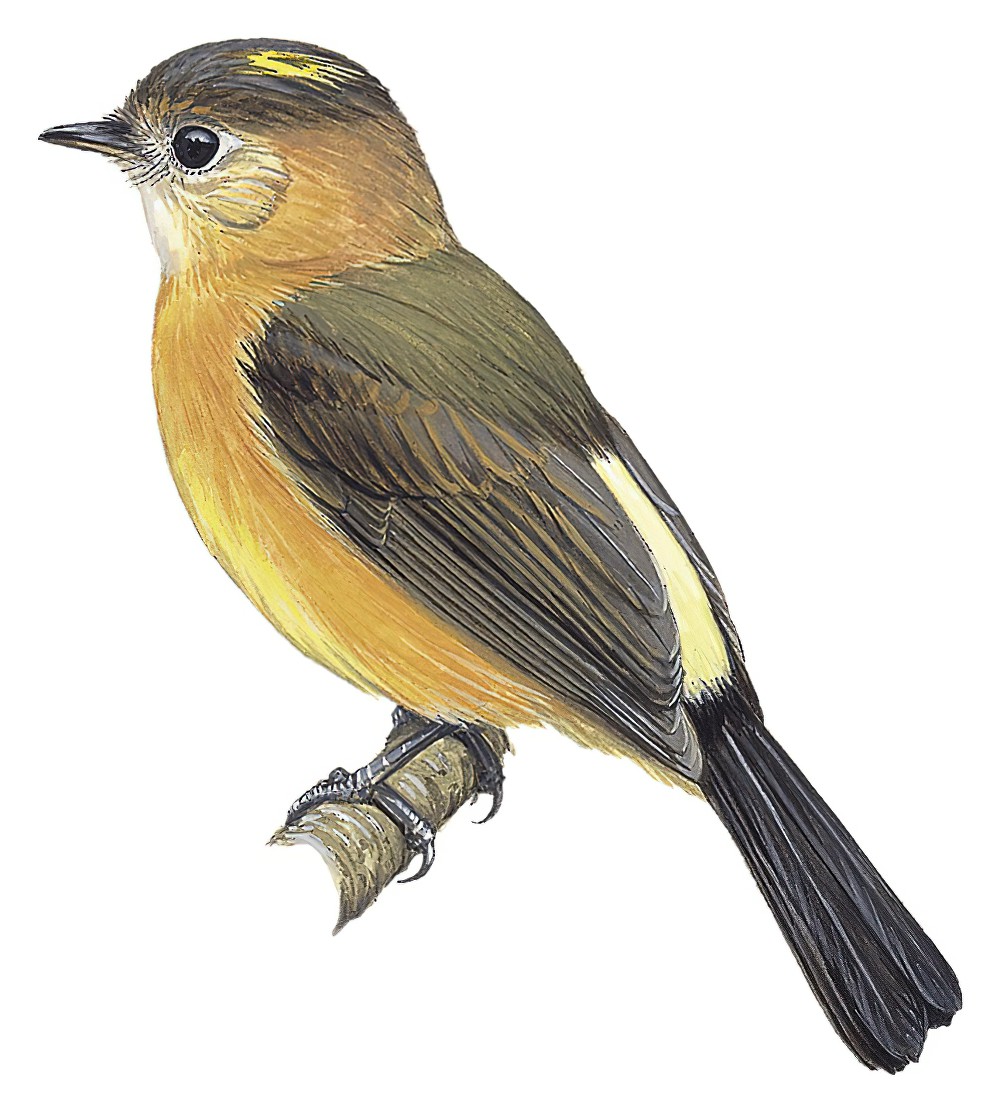Tawny-breasted Flycatcher / Myiobius villosus

Tawny-breasted Flycatcher
SCI Name:
Protonym: Myiobius villosus Proc.Zool.Soc.London Pt(28)1 p.93
Taxonomy: Passeriformes / Oxyruncidae / Myiobius
Taxonomy Code: tabfly1
Type Locality: in rep. Ecuat., part.; cotype from Nanegal, Pichincha, Ecuador, fide Hellmayr 1927, Field Mus. Nat. Hist., Zool. Ser., 13, pt. 5, p. 238.
Author: Sclater, PL
Publish Year: 1860
IUCN Status: Least Concern
DEFINITIONS
MYIOBIUS
(Tityridae; Ϯ Whiskered Flycatcher M. barbatus) Gr. μυια muia, μυιας muias fly; βιος bios living, livelihood; "MYIOBIUS. G. R. Gray. TYRANNULA. Swains. Mr. Gould has adopted for the following species Mr. Swainson's generic appellation of Tyrannula, but Mr. G. R. Gray has pointed out that as Tyrannulus was proposed and published eleven years before, namely in 1816, by Vieillot, it becomes necessary to change the former name, and therefore he proposes Myiobius. 1. MYIOBIUS ALBICEPS. G. R. Gray. Muscipeta albiceps. D'Orb. et Lafr. Mag. de Zool. 1837, p. 47. ... 2. MYIOBIUS AURICEPS. Tyrannula auriceps. Gould, MS. ... 3. MYIOBIUS PARVIROSTRIS. Tyrannula parvirostris, Gould, MS. ... 4. MYIOBIUS MAGNIROSTRIS. Tyrannula magnirostris. Gould, MS." (Darwin 1839); "Myiobius Darwin, 1839, Zool. Beagle, 3, Birds, p. 46. Type, designated by International Commission, Muscicapa barbata Gmelin. ... For use of this name in its accustomed sense see 1956, Op. Decl. Int. Comm. Zool. Nomencl., 13, p. 245" (Traylor in Peters 1979, VIII, 116). It has been suggested that this genus, together with Onychorhynchus and Terenotriccus, be moved to the Oxyruncidae.
Synon. Platyrhynchus, Tyrannula.
villosa / villosus
L. villosus hairy < villus shaggy hair.
● “Hairy Wood-pecker ... the back is black, with a broad white stripe of hairy feathers, extending down the middle to the rump” (Catesby 1731); "59. PICUS. ... villosus. 16. P. dorso longitudinali subvilloso, rectricibus extimis totis albis. Kalm. it. 3. p. 43. Picus varius medius quasi villosus. Catesb. car. I. p. 19. t. 19. Picus varius virginianus. Briss. av. 4. p. 48. Habitat in America septentrionali. Mas occipitis fascia transversa rubra." (Linnaeus 1766) (Leuconotopicus).
SUBSPECIES
Tawny-breasted Flycatcher (villosus)
SCI Name: Myiobius villosus villosus
villosa / villosus
L. villosus hairy < villus shaggy hair.
● “Hairy Wood-pecker ... the back is black, with a broad white stripe of hairy feathers, extending down the middle to the rump” (Catesby 1731); "59. PICUS. ... villosus. 16. P. dorso longitudinali subvilloso, rectricibus extimis totis albis. Kalm. it. 3. p. 43. Picus varius medius quasi villosus. Catesb. car. I. p. 19. t. 19. Picus varius virginianus. Briss. av. 4. p. 48. Habitat in America septentrionali. Mas occipitis fascia transversa rubra." (Linnaeus 1766) (Leuconotopicus).
Tawny-breasted Flycatcher (schaeferi)
SCI Name: Myiobius villosus schaeferi
schaeferi
Maj. Prof. Ernst Schäfer (1910-1992) German Army (SS), ornithologist, explorer, ethnologist in the Himalayas and Tibet 1934-1939, and Venezuela 1949-1954 (subsp. Charadrius mongolus, subsp. Myiobius villosus, syn. Passer rutilans cinnamomeus, subsp. Urocissa flavirostris).
Tawny-breasted Flycatcher (clarus)
SCI Name: Myiobius villosus clarus
clarum / clarus
L. clarus distinct, clear, bright.
Tawny-breasted Flycatcher (peruvianus)
SCI Name: Myiobius villosus peruvianus
peruana / peruanum / peruanus / peruvia / peruviana / peruvianus / peruviensis
Peru. Said to be named after Biru, a local Inca encountered by the conquistadores (although the name is also accredited to a Panamanian cazique). Until the early 18th century the Viceroyalty of Peru included all Spanish possessions in South America.
● ex “Geai du Pérou” of d’Aubenton 1765-1781, pl. 625, and de Buffon 1770-1783, and “Peruvian Jay” of Latham 1781 (syn. Cyanocorax yncas).
● ex “Coq de Roche du Pérou” of d’Aubenton 1765-1781, pl. 745, and de Buffon 1770-1783 (Rupicola).
● Erroneous TL. Peru (= Brazil) (Tangara).
● Erroneous TL. Peru (= Tahiti) (Vini).
UPPERCASE: current genus
Uppercase first letter: generic synonym
● and ● See: generic homonyms
lowercase: species and subspecies
●: early names, variants, mispellings
‡: extinct
†: type species
Gr.: ancient Greek
L.: Latin
<: derived from
syn: synonym of
/: separates historical and modern geographic names
ex: based on
TL: type locality
OD: original diagnosis (genus) or original description (species)












